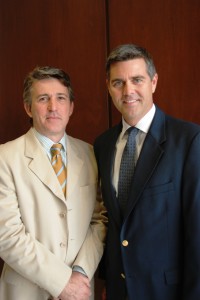As seen in the DAILY BUSINESS REVIEW: “Longtime South Florida builders Venny Torre and Frank Mackle are finding new sources of work from the Chinese drywall crisis and distressed real estate assets. The pair formed TorreMackle Group in Coral Gables this year to focus on distressed-asset work.”
As the industry tries to get a handle on how many homes built this decade are affected, some contractors are looking to remediation jobs as the source of work during the construction downturn.
Once a remediation program is in place, companies will be need to rip out the bad drywall and install new material, builders say.
 By Sept. 3, the U.S. Consumer Products Safety Commission had received more than 1,200 complaints about Chinese drywall from homeowners in at least 24 states. The commission and the Florida Department of Health are testing hundreds of recently built homes to determine how harmful the drywall is to owners’ health.
By Sept. 3, the U.S. Consumer Products Safety Commission had received more than 1,200 complaints about Chinese drywall from homeowners in at least 24 states. The commission and the Florida Department of Health are testing hundreds of recently built homes to determine how harmful the drywall is to owners’ health.
Longtime South Florida builders Venny Torre and Frank Mackle are finding new sources of work from the Chinese drywall crisis. The pair formed Torre Mackle Group in Coral Gables this year to focus on distressed-asset work.
TorreMackle recently finished replacing the drywall in a Coral Gables home and have begun work on a second, Torre said.
“This whole issue works very well with our business plan,” Torre said. “Our position is that you have to get rid of the [Chinese] drywall. If you have a cancer, you have to get rid of the cancer.”
The drywall emits sulfuric gases suspected of harming residents’ health, and damaging wiring and appliances. Not any contractor is qualified to deal with such an extensive problem, Mackle said.
“There’s a misconception that this is a drywall problem — this is a ‘whole house’ problem,” he said. “You can’t just hire a drywall contractor. You need an expert who knows how to disassemble a kitchen in a way it can be put back together.”
Other South Florida builders have thought about getting involved in drywall remediation but decided to pass. That group includes Fort Lauderdale-based Gulf Building, said president John Scherer.
Scherer said the problem confronting contractors considering drywall work is the lack of money to fund the remediation.
“We studied the Chinese drywall issue three or four months ago,” he said. “Contractors can’t fix it because their insurance doesn’t cover it. Individual unit owners can’t afford it, and developers with half-empty buildings certainly can’t afford it. So we decided to stay away from it.”
Another hurdle has been the lack of insurance to cover workers or subcontractors who may be exposed to the drywall or to protect companies from claims stemming from defective installation work. Miami insurance brokerage Beane & Bennett announced on Sept. 4 the creation of an insurance program for contractors who tear out and replace drywall.
Stiles is another big South Florida construction company that’s not interested in drywall work, according to president Doug Eagon.
“I know plenty of people who were putting those materials in with no knowledge whatsoever,” Eagon said. “Fortunately, we didn’t have those. I think for the most part, you won’t find full-blown general contractors getting in the middle of it.”
While it is a potentially profitable avenue to pursue, remediation projects carry significant risk, said Ashley Bosch, president of the Builder’s Association of South Florida. Bosch is also managing director of Miami-based Blok Development Group, which is not taking on drywall work.
“A lot of this is still caught up in litigation,” he said. “And a lot of people are not sophisticated enough to understand what is going on. Just because you remediate something does not mean [the property owner] will believe you did.”
EXPANDED HORIZONS
Construction firms with longtime ties to South Florida must expand their geographic horizons to stay afloat, Suzanne Breistol said.
“Companies that have only done business in the tricounty area are not only looking elsewhere in Florida but all along the East Coast,” she said. “Some are even looking internationally. This brings a whole new set of challenges in finding partners, from subcontractors to manufacturers to suppliers.”
One thing is certain: Builders and contractors have to find ways to adapt and survive, said Bosch of Blok Development. Completing distressed projects may be the only significant source of private work for builders for months to come, he said.
TorreMackle recently landed a project through a receivership case. Developer Merco Group’s unfinished 62-unit townhouse project, Terzetto Villas in Aventura, was placed in receivership by a Miami-Dade County judge in October 2008. Ocean Bank, which had loaned Merco Group $42.4 million, asked the court to appoint a receiver because the embattled developer could not complete the project.
Receiver Philip Von Kahle awarded the project to TorreMackle the project in July.
“There are other projects out there worth completing, but some of the banks might wish to sell them as is,” Torre said.
As the future of distressed projects in South Florida are sorted out by creditors and judges, more opportunities could arise for construction companies willing to take on the risky ventures over the next few years, Mackle said.
“These projects are not for the taking now,” he said. “But they won’t sit there incomplete forever. Eventually, something has to be done.”







 See More Blogs
See More Blogs
Comments